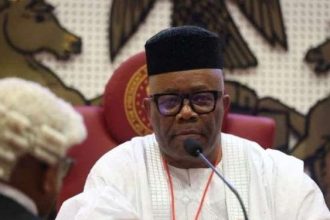A major Nigerian civil society organization, the Socio-Economic Rights and Accountability Project (SERAP), has issued a strong plea to President Bola Tinubu, urging him to intervene in what it calls a “purported threat” by the Minister of the Federal Capital Territory (FCT), Nyesom Wike, to shutter dozens of foreign embassies in Abuja over longstanding ground rent arrears.
The controversial move, which targets 34 embassies allegedly owing property-related fees, has sparked diplomatic concerns and raised questions about adherence to international legal standards.
Posting on social media platform X (formerly known as Twitter) on Monday, SERAP warned that enforcing such a directive could breach international law, specifically pointing to the Vienna Convention on Diplomatic Relations—a key treaty governing the rights and protections of diplomatic missions globally.
“President Tinubu should urgently caution and direct the FCT Minister, Nyesom Wike, to immediately withdraw the threat to close down 34 embassies in Abuja,” SERAP stated in a public message.
At the heart of the issue is Article 22 of the Vienna Convention, which states that diplomatic premises are “inviolable.” The treaty further prohibits any form of coercive action, including search, seizure, or enforcement action against foreign missions and their properties.
“Article 22, paragraph 3,” SERAP highlighted, “clearly stipulates that ‘[t]he premises of the mission, their furnishings and other property thereon and the means of transport of the mission shall be immune from search, requisition, attachment or execution.’”
The call for diplomatic restraint comes on the heels of an announcement by the Federal Capital Territory Administration (FCTA) that at least 34 foreign embassies have failed to pay their ground rents, some of which date back over a decade to 2014. According to official figures, the total amount owed exceeds ₦3.66 million (roughly €2,500), a relatively modest sum in international diplomatic terms but one the Nigerian capital appears determined to recover.
Embassies reportedly on the list of defaulters include those of Germany, Russia, the Netherlands, China, South Africa, Saudi Arabia, the European Union, and India—along with several African, Asian, and Latin American nations.
Some of the amounts owed are symbolic, with individual embassy debts as low as ₦150 (less than €0.10). However, others run significantly higher. For instance, the Zambia High Commission is reportedly in arrears of ₦1.19 million (€800), while Indonesia’s Defence Attaché office owes ₦1.7 million. China’s Economic and Commercial Counselor’s Office is said to owe a symbolic ₦12,000, underscoring the range of liabilities involved.
The issue intensified following an enforcement directive issued by FCT Minister Wike on May 26. His directive targeted nearly 4,800 properties in Abuja with unpaid rents spanning periods of 10 to 43 years. The embassies, despite their diplomatic status, were not excluded from this list.
Faced with mounting criticism and international concern, President Tinubu intervened, calling for restraint and granting a 14-day grace period to the affected diplomatic missions. That deadline expires today (Monday), leaving uncertainty as to whether Wike’s earlier enforcement threat will be acted upon or quietly shelved.
The Director of Lands at the FCTA, Chijioke Nwankwoeze, added fuel to the debate by warning that embassies and other institutional defaulters could be penalized with fines ranging from ₦2 million to ₦3 million depending on the location and category of their property.
While acknowledging the need for improved revenue collection and land administration, SERAP emphasized that due process and international norms must be respected.
“No government should trample upon diplomatic norms in the pursuit of revenue,” the group said, warning that such a move could damage Nigeria’s international image and its diplomatic relationships.
The situation has triggered quiet unease among members of the diplomatic community in Abuja, with some envoys reportedly lobbying behind the scenes to de-escalate tensions. Others are said to be reviewing their legal and diplomatic options, should the grace period expire without further concessions.
This is not the first time the Nigerian capital has struggled with property-related disputes involving foreign missions. However, the aggressive tone and scale of the current enforcement threat stand out, particularly given the highly sensitive nature of diplomatic protocol.
As the deadline looms, all eyes are on President Tinubu’s administration to see whether pragmatism and diplomacy will prevail over what many consider an overly aggressive revenue enforcement campaign.
For now, the international community waits—with concern.





